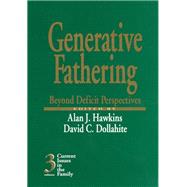- ISBN: 9780761901174 | 0761901175
- Cover: Hardcover
- Copyright: 11/7/1996
Much of contemporary scholarship on fathers comes from a deficit model, focusing on men's inadequacies as parents. This edited volume assembles a group of prominent scholars who go beyond a deficit model of fatherhood to what the editors call a generative fathering perspective. The generative fathering approach, inspired by the developmental theories of Erik Erikson and building on the pioneering research of John Snary, sees the work fathers do for their children in terms of caring for and contributing to the life of the next generation. The editors describe generative fathering, placing it in contrast to the role-inadequacy perspective of fatherhood. Contributors then elaborate on generative fathering in terms of gender, ethnicity, and historical perspectives and present research that helps us understand generative fathering in challenging life circumstances, such as special-needs children, teenage fathering, and divorce and remarriage. Applications for the generative fathering perspective are presented in terms of family life education, clinical work, and scholarly discourse. The editors conclude the volume with a chapter on ways to teach about generative fathering in college courses. Supported by both qualitative and quantitative research, this book goes beyond the frequent identification of fathers as primarily absent, abusive, deadbeat, deficient, or unnecessary, and helps us to understand fathers as men working to build caring bridges across generations.






